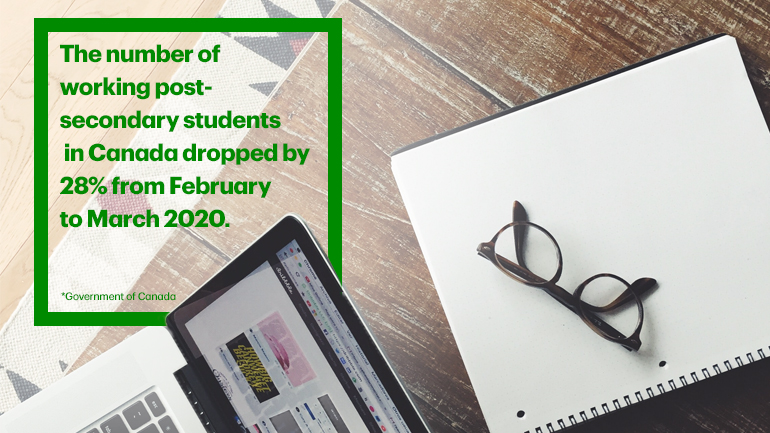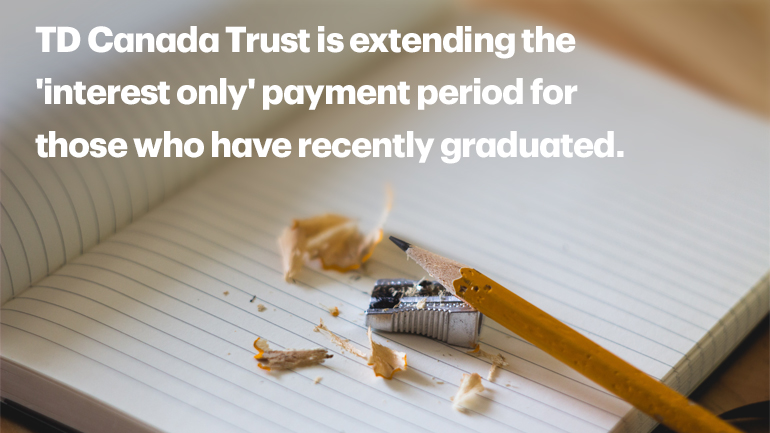Student life comes with its fair share of stress. And with the current COVID-19 crisis upending nearly every industry and institution, students across the country have been confronting additional hurdles as the school year comes to a close.
According to the Government of Canada, the number of working post-secondary students in Canada dropped by 28 per cent from February to March 2020, and it seems likely that physical distancing measures will impact the summer internships and jobs students depend on.
To help Canadian students navigate the unique set of challenges they may be facing during this unprecedented time, we sat down with Michael Sottile, a financial advisor at TD and recent graduate of York University, to hear what advice he has for post-secondary students who are struggling right now.

Tap into government programs
Like many Canadians, students across the country are struggling to make ends meet, a reality both the federal government and banks are keenly aware of.
"The majority of my student clients are concerned about both their summer employment and future job prospects," Sottile said. "Many were planning to work hard this summer to afford the upcoming year's tuition."
To help students facing unemployment as a result of COVID-19, the Government of Canada has implemented several measures, including enhancements to the existing Student Financial Assistance Program and the recently announced Canada Emergency Student Benefit (CESB).
The CESB is designed to provide comprehensive coverage for all students and new graduates, (including those who graduated from December 2019 onward) and provides $1,250 per month for the next four months to eligible applicants. Students with jobs who are facing reduced work hours because of COVID-19 may also earn up to $1,000 a month from this program.
The total investment to the CESB program by the federal government is $9-billion.
"These federal programs have been implemented to alleviate the cash shortfall most students will experience, as well as help ensure students can continue to apply for financial aid in the years to come," Sottile said. "Students in need should take advantage of these programs right away if they are eligible. All of the information they'll need to know can be found on the Government of Canada website."
Find out how your financial institution can help
In addition to government relief programs, Sottile recommends students look into the COVID-19 relief programs available from many financial institutions.
TD has stepped up to help its Canadian student customers by extending the "interest only" payment period of the TD Canada Trust Student Line of Credit (SLOC) for those who have recently graduated and were scheduled to begin principal and interest repayments, Sottile said.

Eligible students who have a TD Canada Trust SLOC will receive a letter informing them that TD is extending the "interest only" payment period of their SLOC until October 31st, 2020.
For customers requiring additional assistance, TD Helps has been working to find solutions on a case-by-case basis, Sottile said.
"If you are a student and need financial assistance, please reach out and get connected with a TD Financial Advisor by making an appointment at your local branch online – we are here to help."
READ MORE: Good financial habits to develop now and keep after the COVID-19 pandemic ends
Study your finances and spending
In early April, Prime Minister Trudeau announced temporary changes to the Canada Summer Jobs Program that will help create 70,000 jobs for students and youth between 15 and 30 years of age. But with so many students and new graduates still facing the prospect of lost job opportunities or reduced work hours, Sottile also recommends taking a deeper look at spending habits to save where they can.
"Whether you'll be in school for a while or are about to graduate, students should be reflecting on their discretionary expenses right now," Sottile said.
Discretionary expenses are any expense that can be removed and will not impact your quality of life. In other words, non-essential items or spending.
"Some of the most common examples of discretionary expenses I see (especially among students) are streaming platforms and app subscriptions," he said.
"The current situation may be an opportunity for students to reflect on their spending more critically than they have before, while some may be taking ownership of their finances for the first time. Tools like TD MySpend (available through the TD app) can help students stay on top of their spending through real-time tracking and goal-setting.
"From personal experience, I've seen how these month-to month savings can be used to pay for school books or to create a savings plan for a future investment, like a house or car. Making small changes now can go a long way in the future when you have your whole life ahead of you."
